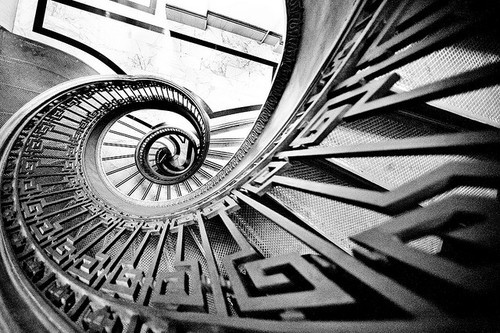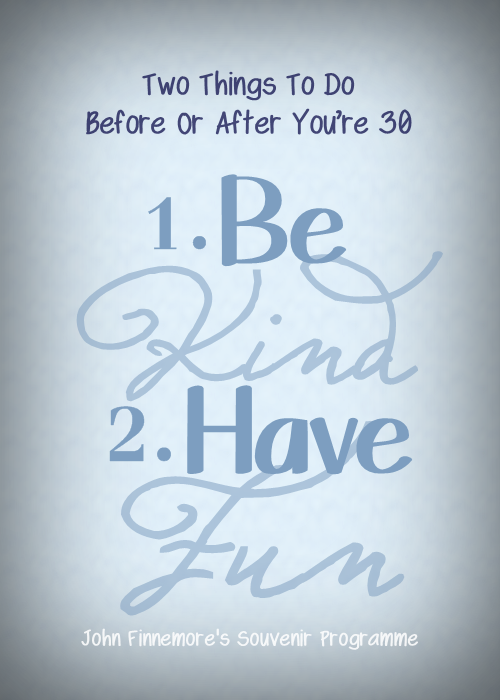"So, do you believe in anything?"
French has the lovely term "l'esprit d'escalier", which refers to that moment on your way down the stairs after an argument when you think, much too late, of the perfect comeback.
I didn't have an argument last night. It wasn't even much of a conversation. I ran into a former acquaintance from the church I went to in high school, and it took her about two minutes to ask if I was "plugged in" anywhere.*
So I said "No." and she said "No?" and I said "No." and she said "No?" and we did that for a while, until eventually she asked if I wasn't still going to my former church, and I explained that I wasn't because I'm not a Christian any more.
Or maybe I misspoke, because based on her face I might have accidentally told her I'd joined a prison gang. (I am a terrible mumbler.)
To her credit, she didn't ask me "What happened?", or "What went wrong?", questions which get my back up for assuming that the truth of Christianity is so self-evident that only some kind of traumatic event could make anyone doubt it. What she did ask me was, "So, do you believe in anything?"
And, put on the spot and already defensive, I said "No." Then, realising what I'd done, I tacked on, "Well, except like human goodness and stuff.", assuming this was obvious.
I laughed. She didn't.
I can't put my finger on exactly what upset me about the interchange. There was a time many years ago when her opinion about my soul would have mattered to me, but I'm long past that now. I'm frustrated that I felt like I needed to defend myself to her ("I'm happy!"), and I'm annoyed that my first response to being asked whether I believed in anything was to say "no". I know that she almost certainly did mean supernatural belief, and so my answer was technically appropriate, but at the same time, I don't like feeding into the myth that not believing in a god is equal to believing in NOTHING.
I identify less and less with atheism as a movement these days, to whatever extent such a herd of cats even exists. I'm still close enough to religion that being not-a-theist matters to me, and so I keep the label, but quite aside from atheism being associated with a bunch of old smug white men (will someone please revoke Richard Dawkins's Twitter privileges OMG), I identify much more strongly with humanism, because it's about the things we do believe in, rather than just the things we don't.
I actually believe in quite a lot of things.
I believe in human goodness, and human fallibility. I believe in finding meaning, beauty and joy in the one life we have. I believe in the scientific method. I believe in Captain Dinosaur. I believe in social justice and equality and tea. I believe in Twitter. I believe in human rights and animal rights. I believe in friendship. I have a moderately strong belief that my house is magic (but don't quote me on that one). I believe in feminism and I think it's flawed. I believe in intersectionality. I believe in chance. I believe in the healing powers of baking. I believe in learning new things and changing my mind with new evidence. I believe that eating animals is wrong. I believe in living as if my life and other people's lives matter. I believe in recognising my own privilege and trying not to hurt people with it. I believe in the Republic of Heaven. I believe in being kind and having fun.
So I think you're wrong about your particular god and you think I'm wrong about your particular god, but could you maybe not look at me as if I've just announced I kick kittens for fun and profit?
So in short, yes, there are things I believe in. And while I came up with this blog post in the spirit of the staircase, it's a bit too long and pretentious for casual conversation, and in future discussions I will be using an abridged version.
I may not believe in the supernatural, but I believe in people and I believe in goodness. And that's enough for me.
*It basically means "being part of a particular church". I'm pretty fluent in Christianese, but this one I really only know from Stuff Christian Culture Likes.
French has the lovely term "l'esprit d'escalier", which refers to that moment on your way down the stairs after an argument when you think, much too late, of the perfect comeback.
 |
| Dammit. (Source) |
So I said "No." and she said "No?" and I said "No." and she said "No?" and we did that for a while, until eventually she asked if I wasn't still going to my former church, and I explained that I wasn't because I'm not a Christian any more.
Or maybe I misspoke, because based on her face I might have accidentally told her I'd joined a prison gang. (I am a terrible mumbler.)
To her credit, she didn't ask me "What happened?", or "What went wrong?", questions which get my back up for assuming that the truth of Christianity is so self-evident that only some kind of traumatic event could make anyone doubt it. What she did ask me was, "So, do you believe in anything?"
And, put on the spot and already defensive, I said "No." Then, realising what I'd done, I tacked on, "Well, except like human goodness and stuff.", assuming this was obvious.
I laughed. She didn't.
 |
| (Source) |
I identify less and less with atheism as a movement these days, to whatever extent such a herd of cats even exists. I'm still close enough to religion that being not-a-theist matters to me, and so I keep the label, but quite aside from atheism being associated with a bunch of old smug white men (will someone please revoke Richard Dawkins's Twitter privileges OMG), I identify much more strongly with humanism, because it's about the things we do believe in, rather than just the things we don't.
 |
| Plus, the logo is adorable. HAPPY HUMAN DANCE BREAK. |
I believe in human goodness, and human fallibility. I believe in finding meaning, beauty and joy in the one life we have. I believe in the scientific method. I believe in Captain Dinosaur. I believe in social justice and equality and tea. I believe in Twitter. I believe in human rights and animal rights. I believe in friendship. I have a moderately strong belief that my house is magic (but don't quote me on that one). I believe in feminism and I think it's flawed. I believe in intersectionality. I believe in chance. I believe in the healing powers of baking. I believe in learning new things and changing my mind with new evidence. I believe that eating animals is wrong. I believe in living as if my life and other people's lives matter. I believe in recognising my own privilege and trying not to hurt people with it. I believe in the Republic of Heaven. I believe in being kind and having fun.
So I think you're wrong about your particular god and you think I'm wrong about your particular god, but could you maybe not look at me as if I've just announced I kick kittens for fun and profit?
 |
| (Source) |
I may not believe in the supernatural, but I believe in people and I believe in goodness. And that's enough for me.
I saw with greater clarity than ever before in my life that when I say “Thank goodness!” this is not merely a euphemism for “Thank God!” (We atheists don’t believe that there is any God to thank.) I really do mean thank goodness! There is a lot of goodness in this world, and more goodness every day, and this fantastic human-made fabric of excellence is genuinely responsible for the fact that I am alive today. It is a worthy recipient of the gratitude I feel today, and I want to celebrate that fact here and now.
- Daniel C. Dennett
*It basically means "being part of a particular church". I'm pretty fluent in Christianese, but this one I really only know from Stuff Christian Culture Likes.
Okay..."plugged in"? Really? Churches are awful at marketing themselves to teens and twentysomethings. When I was involved at St. Pat's, if we had the concept of getting "plugged in", I would have made far too many "that sexy guy over there can plug into me" jokes for the Church to handle.
ReplyDeleteGoofiness aside, I like your approach to humanism rather than atheism. The way you explain it really warms my heart to the idea of it. Before this, I just saw it as a synonym for atheism, but now I can see it as its own entity, and I really like it.
It took me a long time to understand the distinction as well! Technically I'm describing secular humanism, because you can be a religious humanist (I would consider people like Desmond Tutu to be essentially humanist, despite believing in God). The BHA has a good breakdown of different non-religious identities: http://humanism.org.uk/humanism/humanism-today/non-religious-beliefs/
ReplyDeleteI was very naive in expecting all atheists to be good people. Sadly, you can be an atheist and still be a hateful bigot - you're just not using holy texts to justify it. I like that humanism is a positive orientation rather than a negative one, with a focus on actually living a good, ethical life. Maybe I'm being naive again, but I feel like it's harder to be a horrible humanist (if you take humanist principles to heart).
Dawkins lost me around "Dear Muslima"... Plus the whole shitstorm around Atheism+ showed just how full of utter dickbags Atheism really is. On that note, what are your thoughts on A+? To me it seems almost identical to Secular Humanism. I do however like the idea of using reason and critical thinking on more than just Homeopathy and Christianity!
ReplyDelete"Atheist" is a convenient label when you need a quick answer to "What religion are you?", or the easy choice from a set list, but I always like to have a more nuanced answer ready to go. My FB profile condenses it to a one-line thing (I've just noticed Google+ doesn't seem to acknowledge religion as a thing), and anyone who's properly interested can then get the full conversation about what I mean by it, while those who don't care, wouldn't care either way.
ReplyDeleteThe reason I bring it up is that I found the exercise of creating that one-line FB summary of my position really useful as a mental spring-board for when people ask me about it in person. It's how I studied for exams, know that I think about it, by reducing a vast essay down to a handful of keywords and just memorising those. It means I don't have to stop and think about all my past thoughts in detail and process them all from scratch on spot. But I would guess, having written this post, you're already less likely to need to stop and think in future.
Yep, he should have lost me then too. He certainly lost a lot of my respect with that.
ReplyDeleteI was just thinking about A+ when I was thinking about humanism earlier, actually! I like the idea, but I do feel like humanism pretty much has it covered, if I'm understanding them both correctly. I guess it puts more of an emphasis on social justice rather than just on living a good life, which is pretty broad.
Yep, I can see why people who are effectively atheists wouldn't want to use it as a label (same with feminism), but it's still pretty important to me and I'm happy to use it.
ReplyDeleteDistilling something to a sentence is a useful way to think about it. I have a fairly clear idea of what I believe (and I think that, as labels go, "secular humanism" pretty much covers it), and I would have responded differently if she'd asked me what I believe rather than if I believe anything. Even so, I'm always on the defensive in situations like this, and I think you're right that thinking about it in advance will make it easier to be clearer next time.